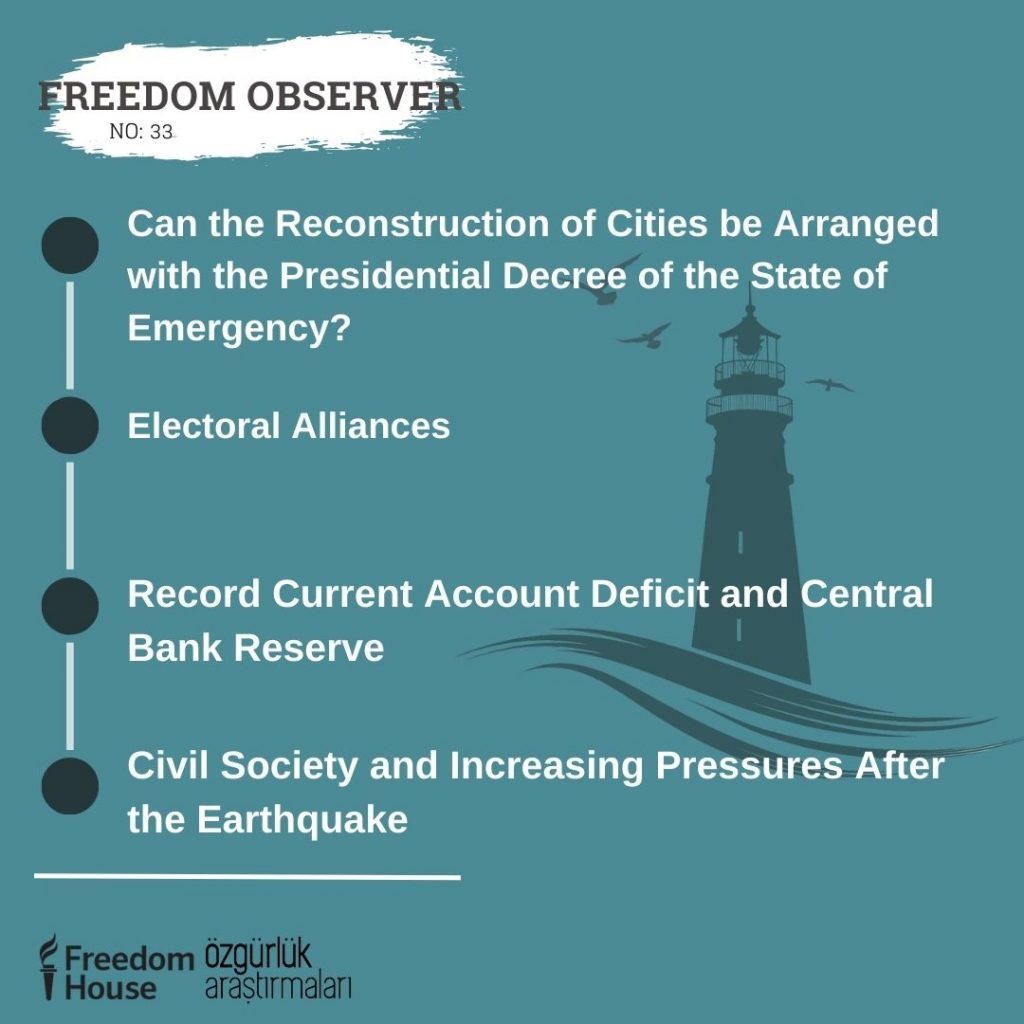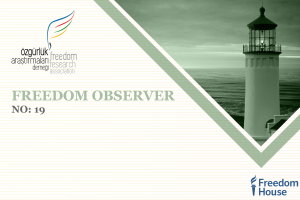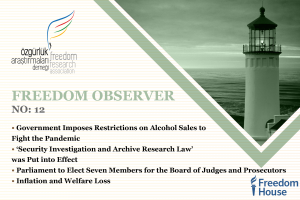
From Editor-in-Chief
With the entry into the election period, the strategies of the political parties and the shape of the election campaigns began to become clear. While the power-opposition relations remained tense, the dynamism began to increase between political parties and also within the blocs themselves. The most important thing in terms of its effect on the election result was that the search for support and alliance among the parties was placed at the forefront of the agenda.
After Meral Akşener’s well-known exit that caused a short-term crisis within the opposition bloc, the ‘Table for Six’ managed to consolidate itself again. Meanwhile, the HDP’s messages regarding the support of Kılıçdaroğlu’s presidential candidacy concealed the confirmation that CHP Chairman Kemal Kılıçdaroğlu was the presidential candidate of the Table for Six. However, this second-largest party in the opposition, which is very important in terms of bringing the AKP-MHP government to an end, has not been able to join the Table for Six. As it is well-known that the İYİ Party is absolutely against HDP’s joining this alliance for obvious ideological reasons, the HDP is also not at all willing to be in the same bloc with the İYİ Party.
While all this has been happening, another bloc, led by HDP, the Labor and Freedom Alliance was formed. The ruling bloc, on the other hand, seems to have expanded its coalition, albeit slightly, with two new entrants whose religious leanings stand out. The striking fact is that one of the new entrants of the ruling bloc has a history with a violent ex-organization. As odd as it is, the ruling bloc has not officially announced its presidential candidate yet. Even so, it seems most likely that the Presidential candidate of the People’s Alliance will be Tayyip Erdoğan, even though it is clearly unconstitutional.
Meanwhile, political power continues to erode the last remnants of the rule of the law. The government generally prefers to make the necessary legal arrangements with the emergency presidential decrees, where a state of emergency was declared due to the earthquake. Among the many decrees issued in this regard, the presidential decree on the state of emergency, published in the Official Gazette dated February 24, is of special legal importance in terms of its long-term effects as well as its weight in dealing with the consequences of the disaster.
This decree, “On Settlement and Construction Under the State of Emergency”, it is aimed to rebuild the cities destroyed in the disaster area and to provide permanent settlements for millions of people. However, as explained in detail below, the constitutionality of this decree is questionable. Although the Constitution gives the President the authority to issue decrees in cases of emergency, on matters necessitated by the state of emergency, it is against the Constitution and the general principles of law to set rules that will affect the legal relations in ordinary periods with these decrees. There is a similar situation for trying to solve this issue by means of a fait accompli. Such an initiative is incompatible with the understanding of “democratic society” and is a candidate to cause irreparable harm in terms of the result it creates.
Another issue is that far from overcoming the multidimensional crisis in which Turkey has been dragged by the AKP-MHP alliance for a long time, the country is getting more and more every day. It can be said that this election campaign will increase the problems. Unfortunately, there is no sign of improvement in the economic crisis, which has impoverished the majority of society and put them in trouble for their livelihoods. The problems in Turkey’s already fragile economy continue to increase in intensity due to the new problems added by the earthquake disaster and the early retirement arrangement. As a matter of fact, according to the latest data, the current account deficit and the budget deficit are gradually increasing, and no significant positive result has yet been achieved in reducing inflation. On the other hand, due to the insecurity created by the government by constantly changing the “rules of the game” in the economy and law, Turkey cannot attract foreign investment capital.
Finally, the earthquake disaster we experienced showed that the non-governmental organizations in Turkey, which have to work on an already slippery slope, protect the notion of “civil” despite the pressures on them. As the earthquake proved that NGOs are more effective than the government and public institutions in these matters. The AKP-MHP government, on the other hand, sees the success of civil society initiatives in healing the wounds of the latest earthquake disaster, as it makes its own incompetence visible, as a threat to itself, and tries to prevent and suppress them. In fact, this government is fundamentally opposed to the existence of an autonomous and vibrant civil society, albeit partly, because it does not take kindly to any formation and activity that is not under its control.
Stay tuned, and see you in the next issue.
* Prof. Dr. Mustafa Erdoğan
Can the Reconstruction of Cities be Arranged with the Presidential Decree of the State of Emergency?
It was announced that in the earthquakes that occurred on February 6 and affected 11 provinces, approximately 165,000 buildings consisting of 520,000 independent units were destroyed or severely damaged. The need for the reconstruction of cities, especially Hatay, Kahramanmaraş, and Adıyaman, has emerged. For this reason, it is urgently necessary to provide temporary shelter for at least three million people, to plan their permanent resettlement, and to return the lives of earthquake victims to normal before it is too late.
After the earthquake, the President declared a state of emergency for three months in the region covering 11 provinces and this decision was approved by the Turkish Grand National Assembly.[1] In this context, the President has issued many Presidential Decrees of state of emergency. Presidential Decree No. 126 on Settlement and Construction Under the State of Emergency, published in the Official Gazette dated February 24, 2023, regulates how the temporary or final resettlement areas of those affected by the disaster will be determined and how the new settlements will be built. According to this Decree, temporary and final settlement areas can be determined directly by the Ministry of Environment, Urbanization, and Climate Change, without complying with the rules stipulated in the Settlement Law. If there is a pasture or forest in these areas, they can be opened to the settlement without complying with the restrictions in the relevant laws. Rights regarding mining and tourism management previously recognized in the identified areas will automatically expire, immovables belonging to public institutions will be registered directly in the name of the Ministry or TOKİ, and privately owned immovables will be expropriated immediately.
The main issue that needs to be discussed here is whether a regulation regarding the determination and construction of permanent settlements can be made with a State of Emergency Presidential Decree (OHAL CBK). According to article 119/6 of the Constitution, a State of Emergency CBK may be issued “on matters necessitated by the state of emergency”. However, it is not possible to say that the new city plan of a province such as Hatay, which was severely damaged in the earthquake, is a matter “necessitated by the state of emergency”. This is because of the fact that OHAL CBKs cannot establish rules that exceed the duration of the state of emergency. In addition to the determination of where a city will be built, new construction efforts should be is an issue that needs to be decided through a democratic and participatory process. While a decision that will determine the future centuries of the city should be made at the end of intensive scientific examination and analysis, as well as discussion, and negotiation processes that take the demands and opinions of various actors and interest groups into consideration, it is clear that starting constructions in a hurry without the plans being announced to the public and without any demand or objection opportunity will have irreversible consequences.
In addition, it is not possible to open forest and pasture areas for construction in violation of the Constitution. On the other hand, privately owned immovables will be expropriated immediately, and disputes over expropriation prices will take many years to resolve. Likewise, all previously granted rights in places designated as residential areas will automatically expire. All these regulations inevitably cause violations of property rights.
However, Article 148 of the Constitution blocked the way to file an annulment action against the OHAL CBKs. While the Constitutional Court had previously ruled in the cases brought against the emergency decree laws in 1991 that it could audit whether a State of Emergency Decree was limited to the requirements of the state of emergency. Yet, in 2016 the Court reverted from this jurisprudence and decided that it could not in any way supervise the emergency decrees. The Constitutional Court will probably adhere to the same jurisprudence for the OHAL CBKs. In this case, CBKs can be subject to constitutional review only after they are approved by the parliament. According to the Constitution, the OHAL CBKs must be discussed in parliament within three months at the latest. It is not possible to predict how long the Constitutional Court will decide on cases to be filed after approval within this period. The lack of control of the state of emergency CBKs will cause serious human rights violations and irreversible social harm.
* Ali Rıza Çoban – Constitutional Lawyer
[1]https://www.mevzuat.gov.tr/mevzuat?MevzuatNo=126&MevzuatTur=19&MevzuatTertip=5
Electoral Alliances
President Erdoğan decided to hold the elections on May 14, 2023. As we have stated in previous bulletins, it should be emphasized again that it is unconstitutional for Erdoğan to run for president for the third time. However, due to the well-known influence of the government on the judicial institutions, especially the Supreme Election Council, and the confidence of the opposition parties in the elections, the political power did not care about this contradiction, and the opposition did not go over this situation. The objections of the lawyers did not attract the necessary attention and the public seems to have focused on the elections. With the announcement of the election calendar, all parties started to seek various alliances and strategic negotiations within the alliance they were placed to achieve success in the elections.
First of all, although the opposition voters, commented that the Table for Six would disintegrate because of the short-term crack in the Nation Alliance caused by İYİ Party leader Meral Akşener’s opposition to Kemal Kılıçdaroğlu’s presidential candidacy, seemed to drift into pessimism for a moment, Akşener returned to the Table after intense negotiations. Although the presidential candidate issue has been resolved by consensus, the issue of whether Nation Alliance will enter the parliamentary election with a joint list, or whether the SAADET, GELECEK, and DEVA parties will enter with a separate list, as it has been discussed recently, and how the distribution between the parties will be in these lists has not been clarified.
On the other hand, although the number of parties in the Nation Alliance has become clear, we observe that the People’s Alliance is trying to include other parties in the alliance. The People’s Alliance continues to negotiate with the Yeniden Refah and HUDA-PAR. The fact that these two political Islamist parties will shift the ideological average of the alliance to the right, especially the existence of HUDA-PAR, which is known to be close to Hezbollah, has become questioned by the public.
Meanwhile, six parties, primarily HDP and TİP, announced that they would enter the elections as the Labor and Freedom Alliance (LFA), and it was agreed that each of the Alliance parties could enter the elections with their names and logos. It is said that in case the HDP is closed it will show its candidates from the Greens and Left Future Party in all cities. In addition, after some members of the Labor and Freedom Alliance announced that they will support Kılıçdaroğlu in the presidential election, the official statement of support of the LFA is expected soon.
Finally, debates continue about whether the candidacy of Muharrem İnce, who announced his candidacy for Presidency, will reduce the probability of Kemal Kılıçdaroğlu being elected. Meanwhile, it is expected that İnce could not stand the pressure from the public and would announce his support to Kılıçdaroğlu.
The pace of interaction and negotiation between political parties is crucial for Turkish democracy. It is hoped that this will continue throughout the election process and, more importantly, that government or judicial institutions will not interfere with the democratic process during and after the election.
* Ömer Faruk Şen – Ph.D. – Missouri University
Record Current Account Deficit and Central Bank Reserve
The Turkish economy broke records in two important data this week. I wish these data were positive for the Turkish economy. Yet, in a country like Turkey, which has both a current account deficit and a budget deficit, it is not welcome at all. The Turkish economy, which is already referred to as “fragile” in almost all economic analyses, is becoming more and more so thanks to the “Turkish economy model”.
According to the data announced on March 12, the current account balance in January increased significantly compared to the same period of the previous year and reached 9 billion 849 million dollars, breaking a record monthly. In this way, the 12-month current account deficit rose to $51.7 billion. However, in January of last year, the current account deficit was 6 billion 889 million dollars. On the other hand, foreign trade data, which is the leading indicator for the current account deficit, shows that the foreign trade deficit will increase in February. This indicates that the annual current account deficit will increase even more. At this point, it should be emphasized that the criticisms made against the “Turkish economic model”, which has been proved as a great failure, are justified. Because when this model was first announced, it was said that it would have a reducing effect on the foreign trade deficit, whereas the foreign trade deficit increased continuously.
When we look at the reasons behind the failure of the model, we can clearly see that these are not economic but political reasons. Because the government thinks that it will lose votes if the necessary conditions are met for the proposed model to be successful. Let’s take a brief look at these conditions:
For the model to be successful, goods produced in Turkey must become cheaper for customers abroad. To this end, the Turkish Lira needs to lose value at least as much as inflation. Thus, it is hoped that exports will increase. However, the government is making great efforts to keep the USD/TRY exchange rate below 19 TL. This causes the Turkish Lira to become more valuable against other currencies due to the effect of inflation. Therefore, although exports increase, imports increase more than exports. In other words, the most fundamental pillar of the model is collapsing.
So why doesn’t the government want the dollar to increase in value? The value of the dollar significantly affects the economic voting behavior of the electorate. The dollar price has been seen as a harbinger of inflation for many years in Turkey. Because Turkey has been a country with a foreign trade deficit for a very long time. Since the increase in the dollar will increase the price of goods coming from abroad (especially electronic equipment and vehicles, which have symbolic importance in terms of consumption), the worry of inflation causes a negative view of the government as there will be a decrease in consumption amounts.
Record Budget Deficit and Earthquake Tax
Just a few days after the record current account deficit, the budget figures for February were announced. Turkey broke another record: Central government budget deficit amounted to 170.6 billion TL monthly. Thus, the 12-month budget deficit rose to 441.6 billion TL. The most striking point was about the interest rates. Excluding interest expenses, the budget, which gave a surplus of 113.4 billion TL in the same period of last year, gave a deficit of 136.3 billion TL in this period. In other words, the central government spent approximately 250 billion TL more than in the same period last year.
As it is known, Turkey experienced a massively destructive earthquake. It would not be wrong to assume that some of these expenditures are the money spent due to the earthquake. But it is not possible to say that such a high expenditure was made to heal the wounds of the earthquake. As a matter of fact, when we look at the expenditure items, we see that most of the budget expenditures increase the current transfers and transfers to state economic enterprises.
It would not be wrong to say that this deficit will increase even more due to the earthquake. On the other hand, we have not yet fully seen the effect of expenditures that can be considered election investments such as the early retirement law (EYT), the increase in civil servant-retirement salary increases above inflation, which will increase the budget deficit. In the period ahead, we will see the effects of these investments more clearly on the budget deficit. According to the figures given by the Minister of Treasury and Finance, Nurettin Nebati, the cost of expenditures such as EYT, minimum wage subsidies, and electricity-natural gas subsidies to the budget will reach one trillion TL this year. On top of that, the expenses that have to be made due to the earthquake will be added.
In all this mess, the government removed some of the tax credits it provided to R&D companies This could be seen as yet another additional tax for these companies. Indeed, in such cases, imposing additional taxes is the primary choice of governments. It goes without a doubt that all citizens should take responsibility to heal the social wounds and eliminate the destruction caused by disasters. As a matter of fact, aid campaigns were also carried out in Turkey and a significant amount of money was collected to be transferred to the earthquake zone. But in an environment where the burden of the early retirement arrangement on the budget alone exceeds 250 billion TL, what is the meaning of the 100 billion TL income that will be provided by the additional tax brought! Unfortunately, Turkey prefers daily political benefits to long-term gains. The interests of the citizens and the government are diverging at an unprecedented pace. In addition, since the country has a fragile economy, the government goes through major rule changes in every disaster. For this reason, the country cannot attract international investments that it needs so much.
* Enes Özkan – Economist, Istanbul University
Civil Society and Increasing Pressures After the Earthquake
Pressures on civil society after the earthquake mostly focused on non-governmental organizations working to meet the needs of the disaster victims and to re-establish the social order.
In order to meet the needs of the disaster victims quickly and effectively, non-governmental organizations took relatively quick and effective initiatives to meet the government’s inadequate search and rescue efforts and urgent basic needs. However, news from the region shows that the work of non-governmental organizations is systematically blocked and terminated because it goes against the government’s interests, especially the Government’s ‘advertisements’.[1]
However, non-governmental organizations continue to seek the rights of the victims and organize aid campaigns by organizing via WhatsApp and Twitter to continue defending the rights of the victims. In this process, with the end of the search and rescue efforts, non-governmental organizations started to work for the re-establishment of social life with the support they received from national and international sources.[2]
After the earthquake, we witnessed that civil society acted in a strong and organized way. In this process, a detailed aid and solidarity campaign was launched. Indeed, there were some difficulties with the coordination of aid; however, there was a period of intense cooperation and organization by the non-governmental organizations specialized in different subjects, such as those divided into categories such as animals, women, LGBT+, the elderly, the disabled, and students, so that no segment of the society would be left behind.[3]
With the onset of the election atmosphere, the number of political statements about whether we were prepared for an earthquake that might occur in Istanbul began to decrease. However, non-governmental organizations from Istanbul made a call by trying to keep their awareness on this issue high during the election process. The 27 non-governmental organizations called the Coordination of Neighborhood Associations and Solidarity Initiatives Against Disaster (AKİK) argued that “the current government and parliament do not show interest in the earthquake issue and the people of Istanbul are almost left to their fate”. AKİK criticized the intellectuals and writers with the words, “Those who should lead the society, probably because they live in earthquake-proof houses, they were not ‘out there’ in the face of this great danger awaiting the people of Istanbul with an inexplicable selfishness.” AKİK, stating that the Istanbul earthquake is approaching for three more years and people’s desperation is increasing day by day, presented a list of suggestions for a solution to the earthquake.[4]
Recently, the distrust of Kızılay and AFAD has been increasing and it has been openly expressed in public. There are frequent reports in the press that AFAD has moved other non-governmental organizations away from the earthquake zone to protect its own reputation. According to these reports, tent cities previously established by other non-governmental organizations were abolished on the grounds that AFAD would establish new tent cities, and the victims were once again evacuated from these tents and forced to move to AFAD’s new tents. Law enforcement officers put pressure on the volunteers by making statements such as “No water can be distributed here outside of AFAD, outside the state”.
Due to the high amount of donations received after the earthquake, the AHBAP Association attracted the attention of government circles, and the association was criticized for not being transparent through social media trolls and tried to be discredited it with fake photos and news. Some of these criticisms need to be looked at closely. AHBAP is an organization that regularly collects large amounts of donations for different social problems and its last audit was carried out in 2018. Considering the information that AHBAP purchased tents and canned food from Kızılay after the earthquake, it can be discussed why AHBAP is not inspected more frequently. AHBAP obtained the materials for the aid with the donations it collects from a pro-government institution that has lost its capacity and its management has been largely corrupted, causing the donations to go to the government circles again.[5]
Finally, if the AKP government wins in the upcoming elections, non-governmental organizations that collect donations and organize aid campaigns after the earthquake may be subject to a new wave of control under Law No. 7262.
* İsrafil Özkan – Director, Freedom Research Association
[1]https://www.evrensel.net/haber/484939/afad-iskenderunda-gonullulerin-kurdugu-cadirlari-kaldirdi-cadir-degil-konteyner-istiyoruz
[2]https://siviltoplumdestek.org/desteklediklerimiz/desteklediklerimiz-2023/
https://twitter.com/gunesasik/status/1627594842099310593?s=20
[3]https://www.sivilsayfalar.org/2023/02/20/sivil-toplum-gucu-ve-cesitliligiyle-deprem-bolgesinde/
[4]https://bianet.org/bianet/cevre/12468-27-sivil-toplum-kurulusunun-deprem-cagrisi[5]https://ahbap.org/bagimsiz-denetim-raporu
https://www.diken.com.tr/ahbap-kizilay-cadirlari-icin-kdv-de-odemis/





